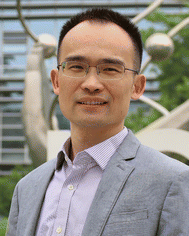Materials Horizons Emerging Investigator Series: Professor Pengfei Cao, Beijing University of Chemical Technology, China
Abstract
Our Emerging Investigator Series features exceptional work by early-career researchers working in the field of materials science.
Professor Pengfei Cao (ORCiD https://orcid.org/0000-0003-2391-1838) is a full professor in the School of Materials Science and Engineering at Beijing University of Chemical Technology (BUCT). Cao leads the research group looking at energy-applied synthetic elastomers. He serves as an associate editor for RSC Applied Polymers and Supramolecular Materials, and is on the editorial board of Macromolecules and MRS Communications. After his PhD in the macro department at Case Western Reserve University, US, Cao moved to Oak Ridge National Laboratory (ORNL), US, where he was a staff scientist from January 2019. Cao has published over 100 journal articles with 80 papers as the corresponding/1st author. He has authored 3 book chapters and 10 international patents. In the past 5 years, he has led more than 15 research projects (8 projects after joining BUCT). Cao was awarded the R&D 100 Award in 2021, ACS-PMSE Young-Investigator Award in 2021 and the ACS-Rising Star in Materials Science in 2023. His current research interests are on synthetic elastomers for energy-related applications, including recyclable, self-healing and adhesive elastomers, polymer electrolytes and passive radiative cooling materials.
Read Pengfei Cao's Emerging Investigator Series article ‘Construction of an ultrathin multi-functional polymer electrolyte for safe and stable all-solid-state batteries’ ( https://doi.org/10.1039/D4MH01037J ) and read more about him in the interview below:
MH: Your recent Materials Horizons Communication demonstrates an ultrathin, multi-functional polymer electrolyte for safe and stable all-solid-state batteries. How has your research evolved from your first article to this most recent article and where do you see your research going in future?
PC: My initial study on polymer electrolytes was mainly focused on the synthesis of ionic conducting polymeric materials along with physical insight between polymer dynamics and ionic conductivity. With deeper understanding of the battery system, I have realized there are more important parameters including the intimate interfacial contact, high electrochemical stability, mechanical robustness and efficient Li+ transport. Herein, aside from the above-mentioned properties, we also enable such a multi-functional polymer electrolyte to have ultra-low thickness that can shorten the Li+ diffusion distance and time.
MH: What aspect of your work are you most excited about at the moment?
PC: Incorporation of multi-functionalities – including intimate interfacial contact, high-voltage stability and efficient Li+ conducting – into one single and ultra-thin polymer network, would be the most exciting aspect in the current work.
MH: In your opinion, what are the most important questions to be asked/answered in this field of research?
PC: In the area of polymer electrolytes, there remains several questions to be answered. For example, except for gel electrolytes and polymer-in-salt systems, can we really design real solid-state polymer electrolytes with ultra-high Li+ conductivity that allow ambient-temperature or even low-temperature battery operation?
MH: What do you find most challenging about your research?
PC: My current research interests mainly include functional synthetic elastomers for energy-related applications, like recyclable elastomers and polymer electrolytes. The ultimate target of the research on functional elastomers is their practical application, however many other factors affect the commercialization of the new synthetic elastomers, like the cost, adaptability with current engineering systems and acceptability of customers. The big picture, of how to bridge our fundamental insight on polymeric materials with the practical application aspect, is a challenging task for current polymer scientists.
MH: In which upcoming conferences or events may our readers meet you?
PC: I have been invited to attend the Gordon Research Conference of polymer chemistry in 2025 in the USA and 2025 Polymer Society of Korea (PSK) Spring Meeting in Korea, but I am not sure of my full international conference plan.
MH: How do you spend your spare time?
PC: After starting to establish my research group in Beijing, I have little spare time because the research group has expanded significantly. Normally, I like hiking, playing badminton or just watching TV at home.
MH: Can you share one piece of career-related advice or wisdom with other early career scientists?
PC: Most of us are not geniuses and it is pretty difficult to make a significant step in one specific area. Most of us need to interact with people from different yet related areas, and definitely need help from our partners and collaborators.
| This journal is © The Royal Society of Chemistry 2025 |

